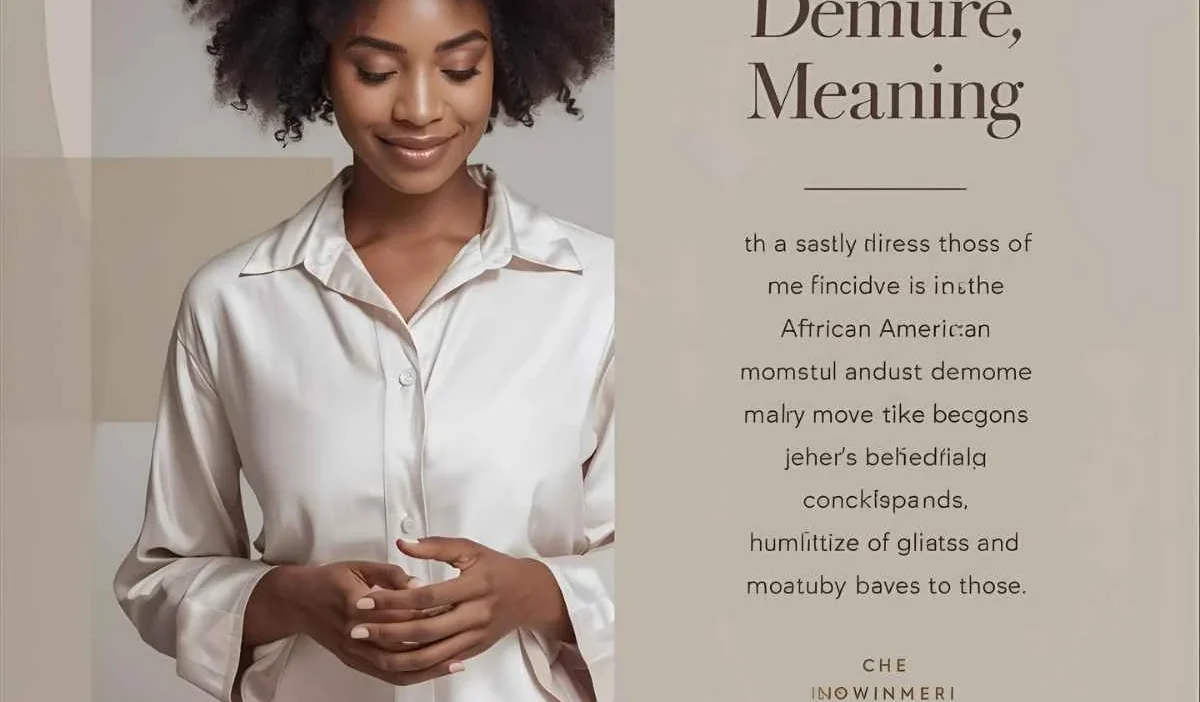Ever heard someone described as “demure” and wondered what it really means? You’re not alone. This elegant word often appears in books, movies, and even social media captions — but its tone can change depending on the context.
In this guide, we’ll break down everything you need to know about the word “demure” — its definition, origin, different uses, examples, related terms, and FAQs — so you can use it confidently and correctly.
What Does “Demure” Mean?
“Demure” means modest, reserved, or shy — especially in a way that’s graceful or polite.
It’s an adjective often used to describe a person (traditionally a woman) who behaves with calmness and self-restraint. While it can sound flattering, tone and context matter — sometimes it can imply being overly shy or conservative.
Origin and Popularity
The word “demure” comes from Middle English “demureness,” meaning quiet or sober behavior, and traces back to Old French roots around the 14th century.
Originally, it reflected proper manners and self-control, virtues highly valued in medieval and Victorian societies. Over time, “demure” evolved to carry both positive (modest, graceful) and slightly old-fashioned or patronizing tones, depending on usage.
In modern times, it’s still widely used in literature, journalism, and fashion — think headlines like “Her demure charm stole the spotlight.”
🌳 Tree of Life Meaning Symbolism, Origin, and Real-Life Significance 2025
“Demure” Meaning in Different Contexts

Let’s look at how “demure” takes on different shades of meaning across situations 👇
1. In Everyday Conversation
When used casually, “demure” often refers to someone who’s quiet, polite, or reserved in social settings.
Example: “She gave a demure smile when complimented on her work.”
2. In Fashion and Media
In style contexts, it’s used to describe elegant but understated clothing — modest, yet sophisticated.
Example: “The actress wore a demure black dress to the premiere.”
3. In Literature or Formal Writing
Writers often use “demure” to portray a refined or composed character — someone graceful rather than loud or showy.
Example: “Her demure presence contrasted sharply with her bold ideas.”
| Context | Meaning of ‘Demure’ | Tone |
| Everyday talk | Modest, shy | Neutral/Positive |
| Fashion | Elegant, understated | Positive |
| Literature | Reserved or composed | Artistic/Formal |
Examples of “Demure” in Conversations
Here are a few natural examples of how “demure” appears in daily communication:
💬 Conversation Example 1
Friend 1: “Did you see Clara at the event?”
Friend 2: “Yeah, she looked so demure in that pastel dress — very classy!”
💬 Conversation Example 2
Colleague 1: “You were so quiet during the meeting.”
Colleague 2: “Just being demure for once — didn’t want to dominate the discussion.”
💬 Literary Example:
“Her demure expression masked a fierce determination beneath the surface.”
Similar or Related Terms
Here are some words related to “demure” to help you understand its nuances better:
| Word | Meaning | Key Difference |
| Modest | Humble and not showy | Neutral tone |
| Reserved | Quiet or restrained | Less about appearance |
| Shy | Lacking confidence socially | More emotional |
| Subdued | Calm or muted in manner | Broader, not just behavior |
| Prim | Proper and neat, sometimes stiff | Can sound judgmental |
Using the right synonym depends on context. For example, “modest” fits better in professional settings, while “prim” might imply someone is overly proper.
How to Use “Demure” Correctly
✅ Do’s

- Use it to describe graceful modesty or subtle confidence.
- Apply it to appearance, tone, or demeanor — not just personality.
- Great for formal writing, literature, or fashion descriptions.
❌ Don’ts
- Avoid using it to stereotype women as overly shy.
- Don’t confuse it with “demur” (which means to object).
📝 Example:
✅ “Her demure manner made a strong impression.”
❌ “He demured to the idea.” (This is actually demur, not demure!)
Common Mistakes or Misinterpretations
Many people confuse “demure” with “demur.”
- Demure (adjective): Modest, reserved.
- Demur (verb): To hesitate or object.
Another misconception is that being “demure” means being weak or submissive. In reality, it often implies grace under control — quiet confidence, not passivity.
FAQs About “Demure”
1. What does “demure” mean in simple words?
“Demure” means being modest, quiet, or reserved — someone who behaves politely and doesn’t seek attention.
2. Is “demure” a positive or negative word?
It’s usually positive, describing elegance or modesty. But in some contexts, it can sound outdated or imply excessive shyness.
3. Is “demure” the same as “shy”?
Not exactly. “Shy” means socially timid, while “demure” adds a sense of graceful composure or modesty.
4. Can men be described as demure?
Yes, though less common. It can describe any person — male or female — who is calm, modest, or restrained.
5. What’s the difference between “demure” and “demur”?
“Demure” describes personality or behavior. “Demur” means to hesitate, disagree, or object to something.
6. How can I use “demure” in a sentence?
Example: “She responded with a demure nod, acknowledging the compliment gracefully.”
Conclusion
Now you know that “demure” means modest, reserved, and gracefully understated.
It’s a timeless word that carries elegance and subtle strength — perfect for describing poise, modesty, or refined charm.
Next time you come across it in a book or conversation, you’ll know exactly what it conveys — and how to use it naturally yourself.
✨ Now that you know what “demure” means, keep exploring our site for more word meanings, slang, and trending expressions!




